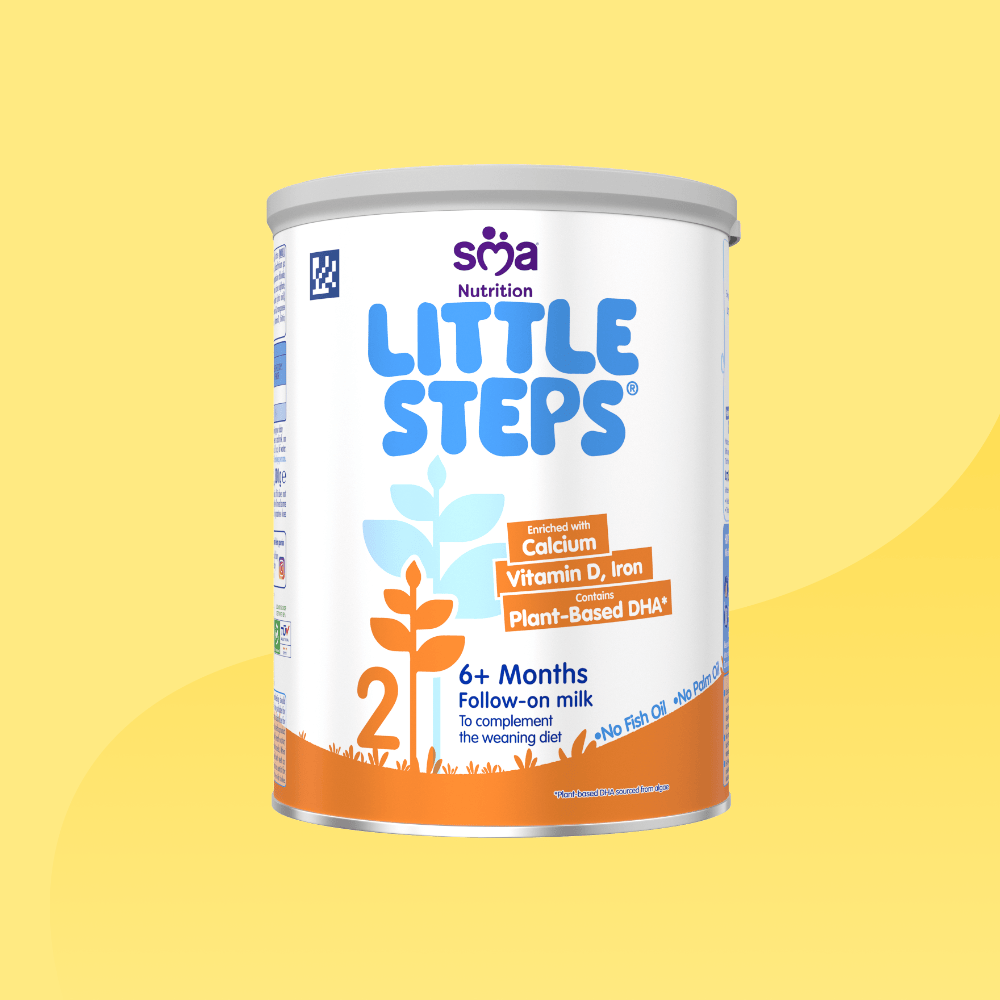LITTLE STEPS® Follow-on Milk
A formula milk containing iron and designed specifically to meet the nutritional needs of babies from 6 months of age as part of a varied weaning diet.
Data cards
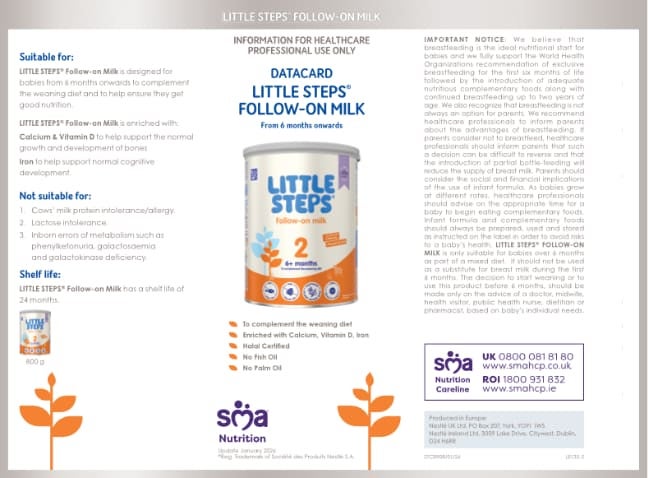
Download the powder format data card
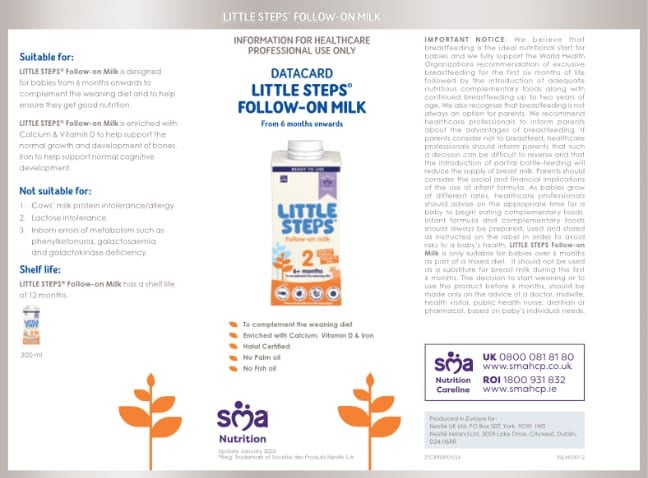
Download the liquid format data card
Product details
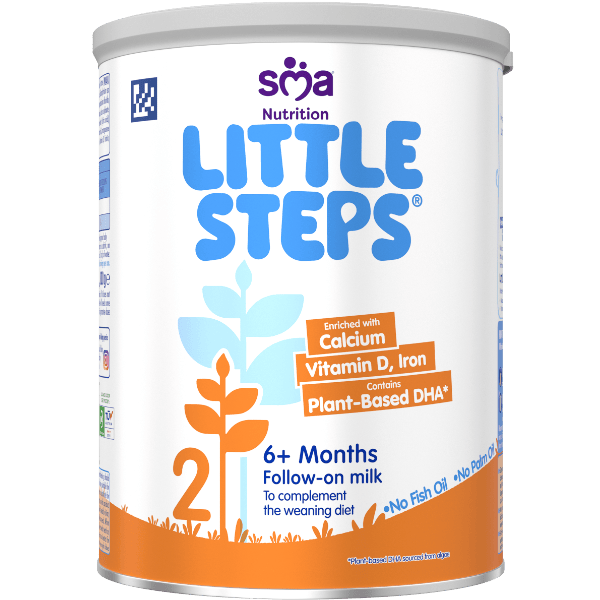
LITTLE STEPS® Follow-on Milk
800 g Powder
The scoop is provided under the lid. It can be stored in suspension inside the can.
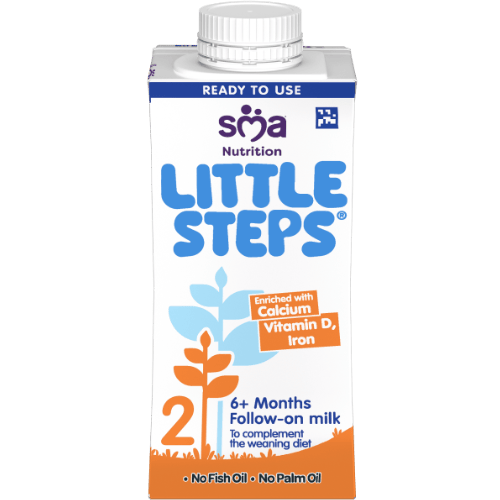
LITTLE STEPS® Follow-on Milk
Liquid Milk (200 ml carton)
Ready to Use resealable carton, which is easy to pour and can be kept in the fridge (5˚C or below) for up to 24 hours.
Powdered milk
| Feeding guide from 6+ months | |||
| 1 serving = 200 ml | Amount of cooled, freshly boiled water | Number of scoops of powder | |
| ml | fl. oz. (approx.) | ||
| 1 beaker/bottle | 180 | 6 | 6 |
All babies are different but try to ensure that from 6 months to 1 year a baby has 500 – 600 ml of LITTLE STEPS® Follow-on Milk per day, either as a drink, on cereals or mixed with food. Mix 1 scoop of powder to 30 ml (approx.1 fl. oz.) of water. Approx. 177 scoops per can. 1 scoop = 4.5 g. Approx. 29 x 200 ml servings per can.
LITTLE STEPS® Follow-on Milk – 800 g can
- Do not add extra powder or water to make the feeds stronger or weaker and do not press powder into scoop. Using too much or too little powder can make your baby ill.
- We recommend preparing each feed in individual beaker/bottles when required.
- For hygienic reasons, discard unfinished feed in the beaker/bottle as soon as possible.
- Made-up formulae can be poured over cereals and mixed with food.
- Do not alter or add to formulae unless medically directed.
- Do not warm feeds in a microwave, hot spots may occur and cause scalding.
- Remember, cows’ milk should not be used as a drink during the first year.
Preparation
How to prepare the baby's feed - powder
Whilst this product is made under strict hygienic conditions, it is not sterile. Failure to follow instructions on preparation and storage may make your baby ill.
- Lennox A et al. (2013) Diet and Nutrition Survey of Infants and Young Children. Available at: https://www.gov.uk/government/publications/diet-and-nutrition-survey-of… (accessed March 2019).
- Irish Universities Nutrition Alliance. (2012) National Pre-School Nutrition Survey: Summary Report June 2012. Food and Nutrient Intakes, Physical Measurements and Barriers to Healthy Eating. City Print Ltd., Ireland.
- NHS (2017). Vitamin D. Available at https://www.nhs.uk/conditions/vitamins-and-minerals/vitamin-d/ (accessed April 2019).
- Food Safety Authority of Ireland (FSAI), (2007). Recommendations for a National Policy on Vitamin D Supplementation for Infants in Ireland. Food Safety Authority of Ireland, Abbey Court, Lower Abbey Street, Dublin 1.
- Domellöf M et al. J Pediatr Gastroenterol Nutr 2014; 58: 119–29.
- Commission Delegated Regulation (EU) 2016/127 on infant and follow-on formulae.
- Scientific Advisory Committee on Nutrition. Vitamin D and health (2016). Available at: https://assets.publishing.service.gov.uk/government/uploads/system/uplo… (accessed March 2019).
DHA, docosahexaenoic acid
LCPs, long-chain polyunsaturates
LRNI, lower reference nutrient intake
IMPORTANT NOTICE:
The World Health Organisation (WHO) recommends exclusive breastfeeding during the first 6 months of life and continued breastfeeding for as long as possible. LITTLE STEPS® Follow-on Milk is only suitable for babies over 6 months as part of a mixed diet. It should not be used as a substitute for breast milk during the first 6 months. The decision to start weaning or to use this product before 6 months, should be made only on the advice of a doctor, midwife, health visitor, public health nurse, dietitian or pharmacist, based on baby’s individual needs.

